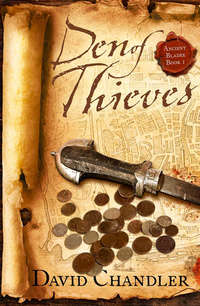
Den of Thieves
In the courtyard something crashed to the ground with a thud that shook Croy’s teeth in his skull. He tried to rise and see what had happened but Bikker just pressed him down again.
He decided the best way to recover his feet was to answer Bikker. “I came to get my swords back. The Burgrave took them from me when he sentenced me to death. I imagine you were there at my hanging—surely you wouldn’t have missed that.”
“I had to leave early,” Bikker said. He wasn’t looking at Croy, but at the ruins of the tower. “I hear it didn’t end well.”
“Oh?” Croy asked.
“You got away. Croy, please do me a favor and keep reaching for the hilt of Ghostcutter. Please, please, try to draw your sword. It will give me the excuse I need to hack you to pieces right now.”
Croy opened his hands wide and stretched them out at his sides. He had known Bikker for a long time. He was quite certain the man was willing to stab him where he lay on the ground, to take his life without the slightest shred of honor or dignity. And yet … he hadn’t so far. He had every opportunity but still let him live. Was it just because Bikker wanted information? Or was it possible there was something still alive in Bikker, some shred of the honor he’d cast off like a stained tunic?
“Surely Hazoth didn’t send you here to kill me,” Croy said. “He could not have known I was here—unless he has been following my movements with a spell.”
Bikker snorted in derision. “The wizard? I doubt he even remembers your name. He has no interest in you one way or another. He has ordered me to be discreet when I’m out in the city. Which is enough to save your life, at least for tonight. Blind me, what is that thing?”
Croy turned his head to look as best he was able at the fresh ruins. He gasped at what he saw. It was as if a nest of gigantic blind asps or equally large worms had been crammed inside one room of the tower and now they were writhing and striking at the air. Yet by the way they moved in concert, he could tell it was a single beast with many arms. Some of its numerous appendages grabbed at the fallen rocks in the courtyard and threw them at the guards that rushed toward it. Other sinuous limbs pushed against what remained of the tower as it tried to drag its enormous bulk out into the night. It made no sound other than a wet slithering.
“Fiend from the pit, do you think?” Bikker asked, with professional interest.
“Or a sorcerous abomination, at the very least,” Croy confirmed. A thought occurred to him. Maybe he had a way of getting back on his feet. “Between Ghostcutter and Acidtongue, we’d stand a chance against it.”
“Just like old times, hmm?” Bikker asked. “Is that what you’re thinking?” He pulled at his beard, the way he always did when he was unable to make a decision. Croy understood, despite himself. The old times had never seemed older. Yet the two of them took an oath once, an oath on their souls. Such things died hard.
“That, and that we could save a number of innocent lives,” Croy said.
“Bah,” Bikker said, but Croy could tell his heart wasn’t fully in the disdain.
The guards and the men of the watch were already peppering the demon with arrows. The missiles seemed without effect, so a detachment of guards were approaching it with halberds at the ready. As they watched, a tentacle lashed out and threw one poor guardsman half across the courtyard. The man landed in a crump of dented mail and broken bones from which he did not rise.
“Both you and I have good reason to flee this place before our faces are seen,” Bikker said.
“And better reason to stay,” Croy insisted. “When was the last time Acidtongue did what it was made for? A bloodied sword—”
“Is a sword that doesn’t rust,” Bikker finished. He looked disgusted for a moment. Disgusted, perhaps, with himself. Then he took his boot off Croy’s chest and offered him a hand up.
CHAPTER TWENTY-FOUR
It was all Malden could do to hold on. His strength was no match for the demon’s, even with half its arms crushed under the fallen tower.
Конец ознакомительного фрагмента.
Текст предоставлен ООО «ЛитРес».
Прочитайте эту книгу целиком, купив полную легальную версию на ЛитРес.
Безопасно оплатить книгу можно банковской картой Visa, MasterCard, Maestro, со счета мобильного телефона, с платежного терминала, в салоне МТС или Связной, через PayPal, WebMoney, Яндекс.Деньги, QIWI Кошелек, бонусными картами или другим удобным Вам способом.
Вы ознакомились с фрагментом книги.
Для бесплатного чтения открыта только часть текста.
Приобретайте полный текст книги у нашего партнера:
Всего 10 форматов